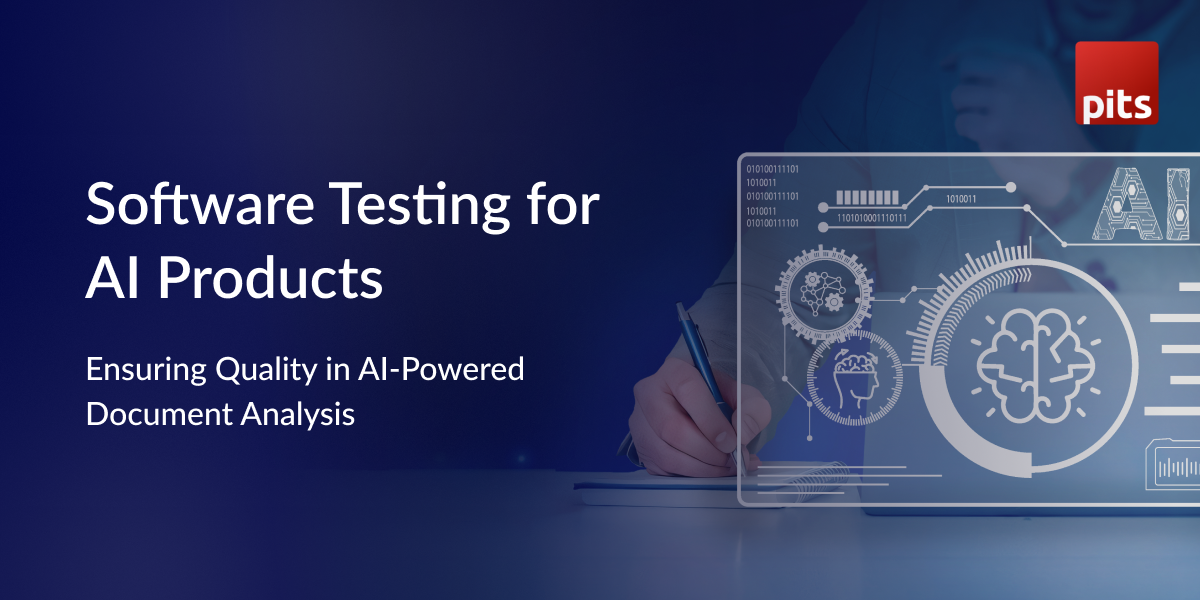Software Testing for AI Products: Ensuring Quality in AI-Powered Document Analysis

Artificial Intelligence (AI) is transforming how we process and manage information, and AI-powered document analysis tools are leading the charge. At PIT Solutions, we specialize in testing AI-powered document analysis solutions like AlcheDoc AI that allow teams to instantly retrieve knowledge, extract insights, and collaborate on documents, eliminating manual searches.
However, testing AI products presents unique challenges. Unlike traditional software, where outputs are predictable, AI systems produce results shaped by data quality, training models, and contextual understanding. This means testing AI applications requires a strategic, multi-layered approach, one that ensures accuracy, scalability, security, and usability.
Why Testing AI-Powered Document Analysis Matters
AI-powered document analysis tools are now indispensable for industries that deal with large volumes of paperwork. Acting like “smart assistants,” they can automatically read and extract key information from documents. This saves time for industries such as law, insurance, and healthcare.
But AI isn’t flawless. It can stumble over illegible handwriting, low-quality scans, or uncommon document formats. Robust software testing for AI ensures these tools are reliable, trustworthy, and free from costly mistakes.
The Evolving Role of Testers in AI Product Testing
In the AI era, the role of a tester has evolved from simply validating explicit rules to acting as a data scientist, investigator, and user advocate. Testers must:
- Understand the basics of machine learning
- Interpret performance metrics
- Anticipate how the AI might fail
With these expanded responsibilities, testers safeguard AI quality assurance, ensuring tools are not just functional but also fair and dependable. With specialized testing methodologies, organizations can confidently deploy AI systems that deliver real value while maintaining high standards of quality.
Unique Challenges in Testing AI Applications
Testing AI products is different from testing traditional software. AI systems learn and make decisions based on patterns in data. This leads to new testing complexities:
- Non-deterministic behaviour – An AI model’s output can vary even with the same input due to internal state and training history.
- Data dependency – Performance depends heavily on the quality and diversity of the training data; biased or incomplete datasets lead to poor results.
- Opaque logic – Deep learning models lack explicit rules, making their decision-making harder to explain or debug.
- Continuous learning – AI models that adapt over time require ongoing monitoring and re-testing to ensure consistent performance.
Best Practices for Testing AI Document Analysis Tools
- Accuracy and Functionality
The core question: does the tool extract the right information?
- Test with diverse documents:
- Law: A clean, typed legal brief; a faxed deposition transcript; a handwritten affidavit.
- Insurance: A standard claim form; a blurry scanned accident report; an email with buried claim details.
- Healthcare: A clear electronic health record; a shorthand-heavy doctor’s note; a printed lab report with complex formatting.
- Verify results: If extracting a claim amount, the tool should correctly identify “$25,000” without missing decimal points or adding extra zeros.
- Regression testing: After model updates, retest using old document batches to confirm nothing broke.
Example: In a hospital, the tool should read a handwritten patient intake form and accurately extract the full name, date of birth, and insurance provider – even if the handwriting is barely legible.
- Document Quality Testing
The quality of input documents directly impacts AI performance.
- Validate file types: Accept PDFs and Word files, reject unsupported formats like random image files.
- Challenge the AI with poor-quality scans: For example, a legal document copied multiple times, resulting in skewed, faint text, should still yield accurate extraction.
- Check for bias: If trained on documents from one region, test with samples from other regions or formats to ensure fairness.
Example: A legal department tests a scanned contract with watermarks and tracked changes. The AI should still identify and flag key termination clauses.
- Testing the AI’s “Brain”
Dive deeper into model robustness.
- Adversarial testing: Feed in a legal pleading with “Plaintif” instead of “Plaintiff” and see if the AI still identifies the correct field.
- Capacity testing: Send 1,000 patient records at once to check for performance degradation or crashes.
- Explainability: For sensitive actions, require justifications—e.g., “Claim flagged as high-risk due to date mismatch between accident report and police statement.”
Example: In hospital billing, if a form lists “Aetna” but the insurance ID matches “Cigna,” the AI should flag it for manual review.
Tips for Better AI Document Testing
- Automate repetitive work – Use scripts to process large document batches quickly and spot issues faster.
- Use realistic test data – Include messy, imperfect documents with stains, low resolution, varied fonts, and inconsistent layouts.
- Test continuously post-launch – Monitor for errors and periodically re-test to maintain performance.
- Collaborate cross-functionally – Involve developers, AI specialists, and end-users (paralegals, claims agents, hospital staff) for valuable insights.
Performance & Security Testing in AI Products
Beyond accuracy, performance and security testing are vital for AI document analysis tools:
- Load testing – Ensure tools scale under heavy document volumes.
- Response time checks – Check processing speed for large inputs.
- Security assessments – Protect confidential information and prevent unauthorized access.
- Compliance checks – Verify alignment with privacy standards like GDPR and HIPAA.
Final Thoughts on Testing AI-Powered Document Analysis Tools
Testing an AI-powered document analysis tool is like preparing a smart assistant for the real world – it must handle clean and messy documents alike, perform under pressure, work with other systems, and keep sensitive data secure.
With PIT Solutions’ expertise in AI testing and software testing services, businesses can confidently deploy document AI tools like AlcheDoc AI, ensuring higher productivity, fewer costly errors, and long-term trust from users.











